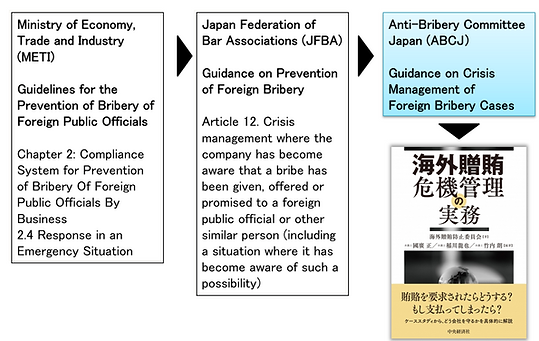Guidance on Crisis Management
of Foreign Bribery Cases
ABCJ published the "Guidance on Crisis Management of Foreign Bribery Cases" in October, 2024.
To cope with the situation that foreign bribery issues have become a significant risk directly linked to the impairment of corporate value for Japanese companies, the Ministry of Economy, Trade and Industry's Guidelines for the Prevention of Bribery of Foreign Public Officials (hereinafter referred to as the “METI Guidelines”) were revised in 2015. In 2016, to complement the METI Guidelines, the Japan Federation of Bar Associations published the Guidance on Prevention of Foreign Bribery (hereinafter referred to as the “JFBA Guidance”), with ABCJ members involved in its formulation.
While Article 12 of the JFBA Guidance refers to the basic elements of foreign bribery crisis management, corporate practices on such incident crisis management have been evolving year by year.
In June 2018, the Plea Bargaining System on Cooperation with Collection of Evidence and Prosecution (hereinafter referred to as the “Plea Bargaining System”) was established through an amendment to the Code of Criminal Procedure. The foreign public official bribery case in Thailand involving Mitsubishi Hitachi Power Systems was the first case to which the Plea Bargaining System was applied. Utilizing the Plea Bargaining System, as part of the foreign bribery crisis management is worth considering, as a measure to reduce the risk of subsequent criminal penalties and reputational risk for companies.
Furthermore, in April 2024, the revised Unfair Competition Prevention Act, which includes strengthening and expanding the offense of bribery of foreign public officials (raising statutory penalties, and expanding the scope of punishment), was enforced, increasing the risk of foreign bribery for companies. In February of the same year, the METI Guidelines were also revised in accordance with this amendment.
In response to these changes, ABCJ has published this guidance with the purpose of specifically outlining the foreign bribery crisis management, based on Article 12 of the JFBA Guidance, taking into account the latest practical trends and including the utilization of the Plea Bargaining System.
Guidance on Crisis Management of Foreign Bribery Cases
LinkS to Other Documents
The ABCJ Guidance provides clarity on crisis management for foreign bribery cases, building on Article 12 of the JFBA Guidance, which supplements the METI Guidelines. It also incorporates the latest practical developments, including the use of the Plea Bargaining System.
For more detailed practical guidance on handling cases related to overseas bribery, our ABCJ's book "Foreign Bribery Crisis Management Practices" (2022, Chuo Keizai Publishing in Japanese) offers insights through three case studies. These cases help examine the appropriate responses companies should take in such situations.

TABLE of Contents
I. Purpose of This Guidance
II. Basic Stance in Foreign Bribery Crisis Management
1. Realize that the offense of bribery of foreign public officials is a crime of the company itself
2. Accurately understand the Plea Bargaining System and consider its active use
3. Implement preventive measures from normal times
4. Incorporate the perspective of compliance promotion into criminal defense activities
5. Implement corporate governance from a stakeholder perspective
III. Corporate Response Upon Detecting Foreign Bribery Incidents
1. On-the-ground response to prevent bribes from being further given or promised
2. Measures for preserving evidence, including material that may be prejudicial to the company
3. Procedures for designating the officers responsible for handling the incident and establishing an investigation team
4. Clarification of authority of the responsible officers and the investigation team
5. Setting and expanding the scope of the investigation
6. Swift and timely communication of investigation results to the headquarters , and timely reporting to the external directors and statutory auditors depending on the seriousness of the incident
7. Consideration of establishing a third-party committee and public disclosure
8. If the investigation results indicate a high possibility of bribery, consider self-reporting to investigation authorities, for official development assistance projects, consulting with the consultation desk established by the Ministry of Foreign Affairs and JICA
9. Based on the facts revealed by the investigation, identifying the causes, formulating measures to prevent recurrence, and disciplining the involved parties
IV. Utilization of the Plea Bargaining System in Cases of Foreign Bribery
1. Plea Bargaining System
2. Corporate responses
3. Responses of the Defense Counsel
4. Negotiations between the Defense Counsel and the prosecutor
V. Response to the Impacts on Foreign Authorities & Public Procurement
1. Response to Foreign Authorities
2. Preservation of Evidence
3. Ensuring Protection Based on the Attorney-Client Privilege
4. Response to the Impact on Public Procurement


